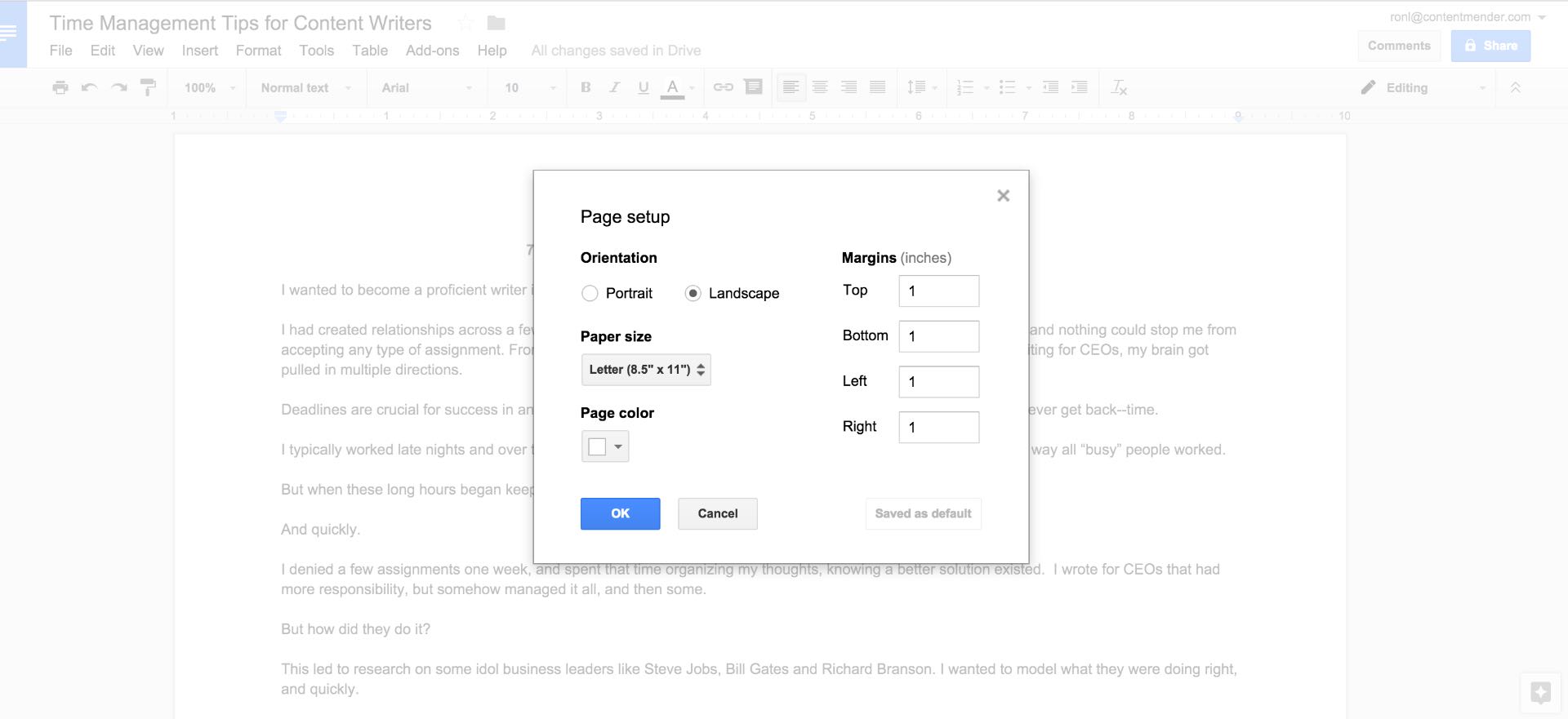Time Management Tips for Online Writers & Bloggers
I wanted to become a proficient writer in my late 20s, but I struggled.
I had created relationships across a few industries, and worked a variety of freelance writing jobs. I was hungry for anything, and nothing could stop me from accepting any type of assignment.
From motorcycle-magazine features to product copy for pet supply companies to ghostwriting for CEOs, my brain got pulled in multiple directions.
Deadlines are crucial for success in any writing field. I never missed one, but at the price of the one thing we can never get back–time.

To achieve this status of never missing a deadline, I typically worked late nights and over the weekends, sometimes up to 80 hours a week. I thought that’s the way all “busy” people worked. But when these long hours began keeping me away from family functions, I knew I had to change.
And quickly.
I denied a few assignments one month, and spent that time organizing my thoughts, knowing a better solution existed. I wrote for CEOs that had more responsibility, but somehow managed it all, and then some. How did they do it?
This led to research on idolized business leaders like Steve Jobs, Bill Gates and Richard Branson. I wanted to model what they were doing right, and quickly.
The theme among them? They had discipline in time management. And if they could, so could I.
A decade later and my studies in time management are ongoing. Nowadays I have 25 times the responsibility I had a decade ago. I work less hours and am more productive.
The reason? Strict time management (check out my latest Forbes piece on time management).
During my weeks intensive in writing, I sometimes produced two-to-three magazine articles for publications like Forbes (ghostwritten for CEOs), and up to 30 blogs. All of the blog content is also SEO optimized, and some is directly posted to the client’s website.
In between there’s also time for some PR and social media management, and I spend every night with my wife and four-year-old son.
I still work some hours at night and over the weekend, but nowadays it’s not about fulfilling content needs; rather, that time is spent on business/self-development. When you truly love what you do, nothing is considered “work.”
Following are time management tips for content writers that result in serious productivity.
Health First
A healthy lifestyle directly correlates to clear thinking. If you’re not fit, immediately incorporate a healthy diet, daily exercise, and the correct amount of sleep into your daily routine.
Think about it; according to reports from stateofobseity.org, 38% of adults are obese, with nearly 8% of those “extremely obese.” I bet a certain percentage of those 38% also have muffled thinking, which will easily slow any portion of the writing process.
Optimal health results in more energy and better decision making, which combine to make work-life smoother, and personal life happier. What client wants to deal with a sleepy content writer, and what child wants to see a parent tired from a stressful day of writing?
I’ve become sort of a biohacker over the past two years, especially through the use of nootropics for cognitive function and overall happiness; do whatever works for you!
Schedule Your Weeks/Block Your Days
Once things slow from the weekend, I take an hour every Sunday evening or Monday morning and loosely plan my week. I highlight loosely because sometimes life will get in the way – but you have to remain as focused on your schedule as possible for true success.
Try to maximize each day with up to only three major assignments (outlines, creation, edits, optimizing content, etc.), and always add some flexibility due to things changing on a day-by-day basis.
On days that aren’t too writing intense, I start around 6 a.m. with a half-hour of answering emails–only ones I can commit to that day–and the another half-hour planning and blocking out time for assignments in at the most 90-minute blocks; this is when I lose focus and need a quick refresh. I basically do something totally different from writing such as reading a book or cleaning my desk.
On writing-intensive days, I awake and immediately begin. Sometimes I’ll go as long as five hours without zero distractions, though I still take those smaller breaks in between for a few minutes to adjust my eyes.
Once this type of scheduling becomes routine, you can achieve in a day or two what takes others a week or two.
Again, prioritize only up to three items each day, and have a secondary list of two-to-three items that aren’t as pressing.
Some days you may have an extra hour or half-hour “open”; try not block all this time at once, but periodically throughout the day such as two half-hour segments or four 15-minute segments; this will help you get extra work done with less energy, or do a mindless activity to help your mind refresh.
Other days, though, you may have something serious surface like personal or client issues. Once the situation is under control, don’t be afraid to go back and re-plan your remaining hours. The simple act of writing the stuff down is usually enough to motivate and get the mind focused again.
Also, reserve some time during each day for some physical activity, whether it’s a walk around the block or a visit to the gym.
I used to use a spreadsheet for blocking out hours, but now I do it by hand on Tools4Wisdom planner. There’s something about physically outlining tasks that makes it easier for me.

Keep Social Media/Texts/Email Notifications Off
This one had a huge impact on me when I started working full time from home a decade ago. It’s all about remaining 100% focused on the SINGLE piece of content you’re writing.
A study from the University of California says once interrupted or distracted, it takes nearly 25 minutes to get your head back into the task at hand. Any type of social media, text, email or any other communication tool needs to be off.
They are as disrupting as your typical office situation, which are dire for writers who need 110% focus to produce quality material.
And every–yes every–office situation I worked in, from a newsroom to product supply company to a digital marketing agency, was dominated by endless distractions or pointless impromptu meetings.
From short talk about weekend sports to problems with a coworker or boss, distractions sometimes fill the day. Think of the billions of dollars companies waste due to lack of productivity from distractions in the office.
Periodically Check Emails; Open Only Ones You Can Commit To
I let my family and closest associates know that I only check emails every three hours during normal workdays, and only twice during writing-intense workdays. If something is pressing or demands immediate attention, don’t email or text–call.
Another tip I learned from the late Chet Holmes, writer of a book everyone should read regardless of career, “The Ultimate Sales Machine,” is only open the emails you can commit to.
Holmes writes: “If you touch it, take action. That’s the first step to great time management. Don’t open that email until you’re ready to deal with it.”
Don’t let email control you.
Learn to Say No
Writers need to learn to say no to providing quick answers to non-planned assignments. I see this over and over at businesses with staff writers. It may be a salesperson asking for a “catchy” email subject line, or an SEO asking for the “clever” title tag.
Besides the interruption from your current assignment that results in a lack of focus, immediate suggestions usually result in sloppy suggestions, which makes you and the company look bad.
Just because you’re a writer doesn’t mean you can immediately spew out anything that needs to be written. Quality writing takes time.
Keep Similar Writing Subjects Close Together, and Prioritize
Contingent on the workday, writers sometimes produce content about drastically different subjects within a few hours. To keep the mind flowing smoothly, order your day by grouping similar subjects together.
Say you are working on six pieces of content for the week for six different clients: two for a motorcycle manufacturer, one for an HVAC owner, one for a lawyer, and one for a medical center.
First, you group them together and then prioritize from hardest to easiest based on expertise in subject matter. Since I have 10 years of experience in the motorcycle industry, I’d start with the hardest stuff first, and work my way down: medical, lawyer, HVAC, and motorcycles.

Use Less Brain Power: Think Clearer, Write Quicker
Earlier this year, I participated in an online business writing seminar with Charles Euchner, author of “The Elements of Writing” who taught writing classes at Yale. This is the type of education I wished I had received decades ago.
The Elements of Writing is a must-read for every writer, and puts the writing process into a 1-2-3 format of storytelling, mechanics, and analysis.
This will help you save time while writing, but the most important advice I had received from that seminar was about reserving brain power through visualization of text.
Euchner says to use a “Horizontal” view when writing. How? In four easy steps:
- From now on, use “Landscape” view over “Portrait” view in documents (Google Docs: File > Page Setup > Orientation > Landscape; Microsoft Word: Layout > Page Setup > Orientation > Landscape).
- Write one sentence per line.
- Single space your document.
- Skip a space between paragraphs.
This not only helps you save brain energy, it also helps you focus on each sentence, line by line.
The clutter-free visual makes editing simpler, from grammar to flow of every single sentence.
When the final edits are complete and laid out in separate sentences, put the piece into paragraph form; this also forces you to read your work again and make stronger edits.
Concluding Thoughts
Writers can achieve more than possible by following these seven simple time management tips. Implement them into your schedule immediately, and begin a daily routine.
By nature, once a routine is established, things become easier and smoother. The same can be said for your writing, which will only improve in both quality and productivity due to absolute focus.
Remember, though, that disruptions will happen. The solution is to deal with them, and quickly get back to your schedule and complete the day’s tasks.
Always strive for proactiveness over reactiveness; this will help you find more of that stuff we can’t afford to lose: time.


